
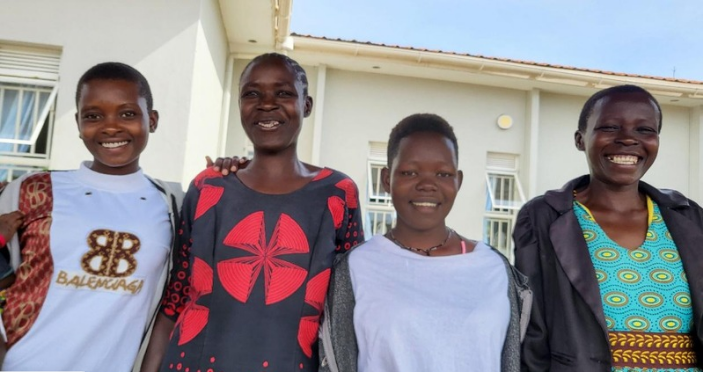
Executive Director’s Remarks
Dear Reader
Each quarter, I express my pleasure in presenting highlights of the impact of TERREWODE and its project, Terrewode Women’s Community Hospital (TWCH)– this quarter is no different.
Welcome to the 20th edition of The Association for Rehabilitation and Reorientation of Women for Development (TERREWODE) newsletter, which is packed with heartfelt anecdotes and stories that speak to our mission.

This quarter, 136 women and girls suffering from obstetric fistula and other childbirth injuries received holistic, patient-centered treatment at TWCH. In The Evening Before Discharge, you’ll get a glimpse into the reflections of patients the night before returning home. Reintegration continues to be a critical part of our work. In 123 Survivors Receive Individualized Reintegration Training, our dedicated team shares insights from the training conducted this quarter. The distinctness of our reintegration program lies in our individualized approach. Learn about what that meant for a younger cohort of survivors in Young Survivors Shape Their Reintegration Journey.
This quarter was one of celebration. As we commemorated International Women’s Day under the theme “Accelerate Action” with a screening outreach in Kyankwanzi District, Awor Florence celebrated the restoration of her continence after 24 years by hosting a party and inviting her entire community. Read these stories in ‘Accelerate Action’: Reaching Remote Communities and “This is a Celebration for My New Life…”–Awor Florence.
To equip and motivate our team for the year ahead, TERREWODE staff participated in a three-day workshop detailed in Comprehensive HR Training to Kick Off the Year. Meanwhile, our Board of Governors convened to guide operations for the rest of the year during the Mid-Year Performance Review Meeting, and the quarter concluded with a Quarterly Quality Assurance Review to Strengthen Holistic Care.
I was honored to represent TERREWODE, alongside Laura Miller and Dr. Rahel Nardos from the University of Minnesota, at the 2025 Consortium of Universities for Global Health (CUGH) in Atlanta, GA, where we presented a poster titled A Retrospective Review of Gender-Based Violence Amongst Women Seeking Treatment for Fistula and Other Childbirth Injuries at Terrewode Women’s Community Hospital.
I extend gratitude to both the Board of Governors and the Board of Directors, management, staff, volunteers, and project beneficiaries, as well as to our partners and stakeholders. Thank you for collaborating with us, and we look forward to a productive quarter ahead.
Enjoy Reading!
Alice Emasu Seruyange,
Founder and Executive Director.
TERREWODE and Terrewode
Women’s Community Hospital
The Evening Before Discharge: Patients Reflect on Treatment at Terrewode Women’s Community Hospital
This quarter, Terrewode Women’s Community Hospital (TWCH) provided holistic, patient-centered care to 136 women and girls suffering from obstetric fistula and other childbirth injuries. On the evening before discharge, four patients were sitting outside the ward chatting when we asked them to reflect on their journeys. They shared how they discovered the hospital, their experiences during treatment, and the dreams they were now eager to pursue. Here’s what Betty Aseno, Oliver Among, Agnes Akello, and Kevin Acam had to say:
ON FINDING TWCH
How did you hear about TWCH?
Betty Aseno
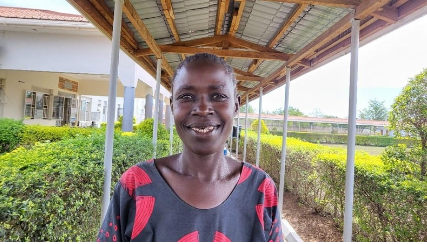
"I first heard about Terrewode Women’s Community Hospital on the Voice of Teso Radio. That was around July 2023. The station hosted a woman who told a story that captured my attention. It was about how she was chased from her community because she had fistula. I remember she spoke for almost 20 minutes, and at the end, she talked about how TERREWODE treated her. I wrote down the toll-free number and kept it. It took me some time to call because I was scared. But, in January this year, I finally did it."
Agnes Akello
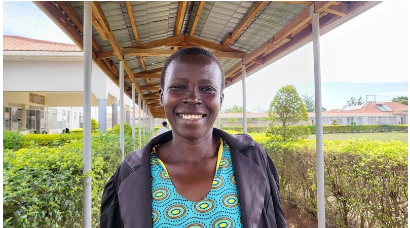
"For me, it was the doctor who operated me at Atutur Health Center IV. When I told him that I was leaking urine, he wrote me a referral letter to Terrewode Women’s Community Hospital."
Oliver Among
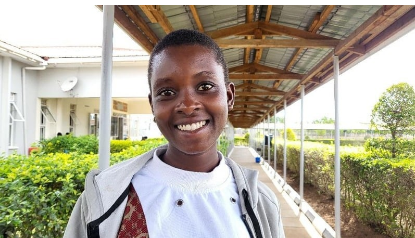
"I was still at Atutur Health Center IV in Kumi. I was recovering after giving birth when I realized that I could not control my urine. It was my mother who told me to reach out to a woman in the market who she knew had fistula and received treatment. The woman came to visit me when I returned home and we called Terrewode Women’s Community Hospital, and they told me to come for screening."
Kevin Acam
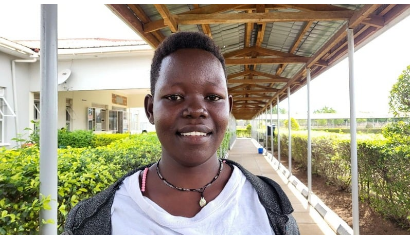
"I gave birth at a hospital nearby, Soroti Regional Referral Hospital. I lost my baby and the doctors told me I had two fistulas: a VVF (vesicovaginal fistula) and an RVF (rectovaginal fistula). They [doctors] told me, “Don’t worry, we know somewhere you can go for free.” I didn’t believe them, even when I came here and was admitted, I kept thinking in the back of my head that they would ask me for money or something, but they didn’t. And now I don’t have a fistula at all."
ON RECEIVING CARE AT TWCH
How would you describe your experience of receiving care at TWCH?
Agnes Akello: I received so much love and care. Everything was provided for me–food, soap, bed sheets, and counseling. This attention made me feel comfortable, and I made friends with the other patients who are here. It made me forget all about how people treated me before I came here for treatment.
Betty Aseno: When I arrived at the hospital, the nurses welcomed me. I had not experienced such a thing at other hospitals. The woman who spoke on the radio was right about the friendly environment here. Throughout my entire time here, I have felt truly at home.
Acam Kevin: This is the best treatment I’ve ever received.
Oliver Among: I never imagined that treatment could be 100% free. On top of that as Betty said, I also felt at home. When I was too weak, after my surgery, the caretakers took good care of my baby and told me that they wanted me to focus on one thing: recovering.
ON PLANS FOR THE FUTURE
What do you look forward to doing once you are fully recovered?
Betty Aseno: I plan to start planting ikanyum (sesame seeds), as I believe it will yield a good harvest by the end of this rainy season. This will help me and my husband to pay for all our children to go to school.
Kevin Acam: I have one dream. Since I was young, I wanted to be a policewoman to protect the young girls in my community. My parents are willing to support me, so I want to go for training to become a policewoman.
Agnes Akello: I am eager to restart my business. I used to sell silverfish in the market, but when I got fistula, people did not want to buy from me because I smelled. Now, I am healthy and I can continue to support my family.
Oliver Among: When I have fully recovered, I want to learn hairdressing and start braiding hair for women in my village. I want to start slowly then when I have enough money and skills, I want to open my own salon.
All the survivors (former fistula patients) have been enrolled in the TERREWODE reintegration program, where they will receive economic, social, and psychological support over the next few quarters to help them realize their dreams.
123 Survivors Receive Individualized Reintegration Training
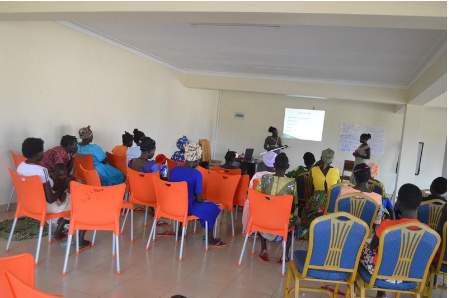
Survivors during a health education session at the TERREWODE Reintegration Training Center.
This quarter, 123 survivors (former fistula patients) participated in our individualized reintegration training program. Each survivor received health education and counseling, both in group and individual settings, while 51% of them also received additional training in income-generating activities and advocacy.
Mary Adiedo, program staff in charge of psychosocial support and counseling services, reflects on the reintegration training conducted this quarter, “The young women showed interest in the practical sessions, especially the hands-on classes in cooking and baking, tailoring and design, and soap making. The survivors now have the skills and confidence to start their income-generating activities of interest in their communities.”
Adding, “Group therapy remains a viable strategy for increasing self-esteem and emotional healing, and building sound decision-making abilities for survivors. This is a core aspect for their reconnection to communities.”
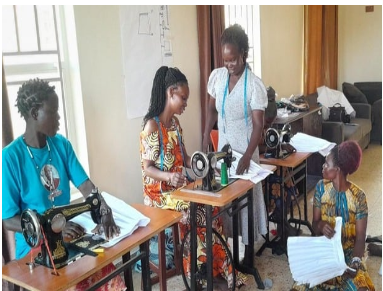
Survivors learning to sew during a Tailoring and Design class as part of their reintegration training.
Stella Apio, program staff in charge of community outreach, emphasizes the importance of the human rights aspect of the training, “The survivors received in-depth knowledge on Sexual Reproductive Health and Rights during the reintegration program. Many survivors felt that sharing their personal experiences would be helpful, both to them and to others. Their experiences of violation of human rights highlights that their healing extends beyond repairing childbirth injuries. The empowerment they receive to denounce practices that dehumanize them and advocate for other women and girls in their community is core in their recovery journeys.”
Quarterly Quality Assurance Review to Strengthen Holistic Care
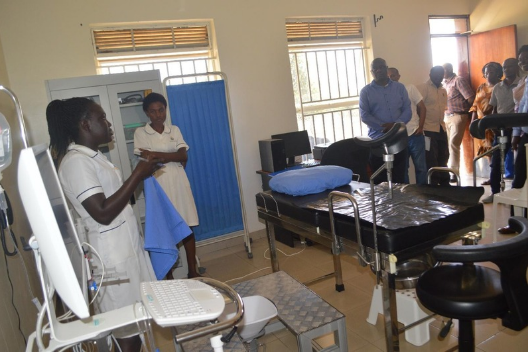
The Clinical Excellence and Quality Assurance Committee inspects the urodynamics clinic during their quarterly visit.
On February 13th, 2025, the Board Committee on Clinical Excellence and Quality Assurance conducted their quarterly visit to Terrewode Women’s Community Hospital (TWCH). The visit was led by Dr. Robert Olupot, the committee chair, and fellow committee members Dr. Amandua Jacinto and Physiotherapist Robert Katsigazi. They were joined by co-opted experts: Dr. Fekade Ayenachew, certified specialist trainer and member of the expert advisory group for the International Federation for Gynecology and Obstetrics (FIGO); Dr. Perez Katambale, a researcher and urologist; and Dr. Godfrey Alia, obstetrician and gynecologist at Mulago Hospital.
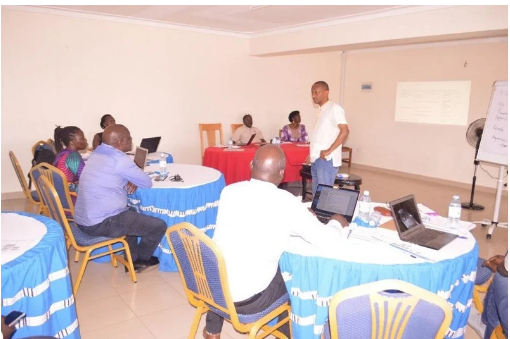
Dr. Fekade Ayenachew (standing) leading a session reviewing TWCH’s management frameworks for holistic care.
Using the TWCH Quality Assurance Tool, the committee evaluated performance across departments and facilitated a comprehensive review of the hospital’s care systems. Key areas of focus included the patient care algorithm, Center of Excellence tools, staff capacity-building programs, and the development of draft policy statements. This one-day engagement reaffirmed our commitment to delivering high-quality, holistic, patient-centered care at TWCH
‘Accelerate Action’: Reaching Remote Communities
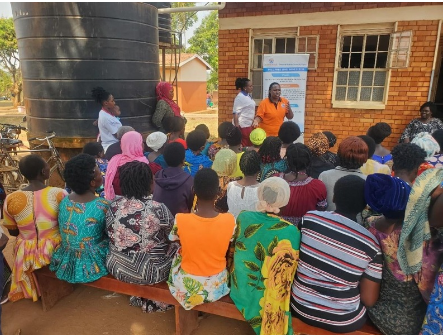
Redempta Amiro, program staff (standing, in orange t-shirt) conducting a health education during a community outreach in Kyankwanzi.
To mark International Women’s Day, celebrated under the theme ‘Accelerate Action’, TERREWODE conducted a screening outreach in a remote community in Kyankwanzi district. In collaboration with Butemba Health Center IV, the outreach team delivered health education on obstetric fistula treatment and prevention. During the event, women and girls from surrounding communities received screening services, and seven were admitted to Terrewode Women’s Community Hospital for specialized care.
Comprehensive HR Training to Kick Off the Year
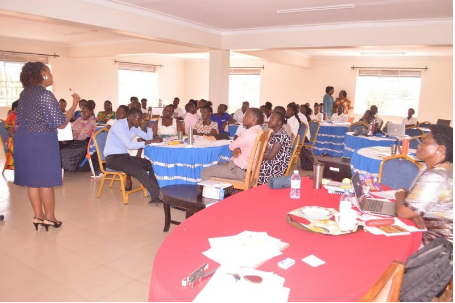
Ms. Olivia Kiwummulo facilitating a session during Day 1 of the Human Resource Training at Terrewode Women’s Community Hospital.
TERREWODE began the year with a comprehensive three-day Human Resource (HR) training, engaging 98% of staff, including volunteers. The sessions revisited core HR policies and organization values, while equipping staff with practical tools for effective communication, conflict resolution, stress management, and teamwork.
Facilitated by consultant HR specialist, Ms. Olivia Kiwummulo, with support from TERREWODE’s HR Officer Ms. Diana Kyesitalo, the training employed interactive methods such as group discussions, and self-reflection exercises to foster active learning and appreciation for the material.
Reflecting on the training, Dr. Moses Cherop, TWCH obstetrician and gynecologist, emphasized, “We [staff] need to lead by example and uphold the organization’s core values in every single thing that we do, even when no one is watching. We also need to demonstrate professionalism and strengthen a culture of accountability.”
Mary Adiedo, program officer in charge of psychosocial support and counseling services, resonated with the importance of effective communication in the workplace, effective communication in the workplace, “I realized that a workplace cannot be without challenges, but having systems to turn to when we encounter them can help us overcome them. Some challenges have been a result of miscommunication. This workshop gave me a couple of practical ways to improve information flow with my team.”
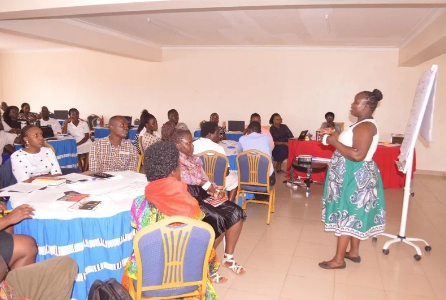
Ms. Stella Apio, program staff in charge of community outreach, presenting after a group discussion at the Human Resource Training in January.
“This is a Celebration for My New Life…”–Awor Florence
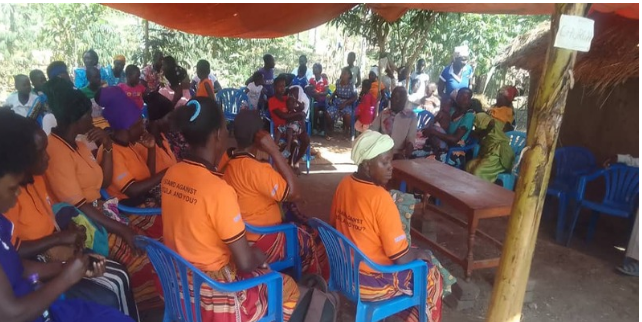
Guests at Florence’s celebration party hosted at her home in Namaganda Village.
In February 2025, Awor Florence, 43, hosted a party at her home in Namaganda Village, Namayingo District, to celebrate her recovery after living with obstetric fistula for 25 years.
“I am happy that you came today. I have felt a burden for a long time, and blamed other people. Only God knows how many tears I have shed. But, today, it is time to celebrate because I am healed. This is a celebration for my new life, and I want everyone to see me happy," shared Florence with friends, family, community members, and church leaders gathered at her home.
During the celebration, she spoke about the stigma she endured–how her husband sent her back to her parents’ home, how neighbors spread rumors that she was bewitched, and how she gave up hope of her life ever returning to what it was before fistula. She also recounted how she learned about Terrewode Women’s Community Hospital (TWCH): through a survivor conducting health education in Namaganda Village. The survivor, also from Namaganda, had faced similar experiences before receiving treatment at TWCH and completing the TERREWODE reintegration program. Florence’s hope was restored by the survivor.
“I want us to be more supportive of each other.” Florence said. “Do not shun anyone because of their condition. You have no idea how much it means when someone is able to see that you are struggling with something and not mistreat you because of it. Fistula is curable, so let’s support the women who need treatment to get it.”
After Awor’s remarks, the guests mingled and enjoyed a performance by the Nambula Mwiho Awamba Omwicha Fistula Solidarity Group (FSG), one of the 46 survivor-led FSGs, a core TERREWODE advocacy program.
Moved by Florence’s experience, the LCI Chairperson of Namaganda Village said, “All of us have heard what Florence went through for so many years. Her bringing us here, together, is inspiring. Florence, we are proud to have you in our community. We are happy that TWCH is supporting you and other women too by preventing them from experiencing fistula.”
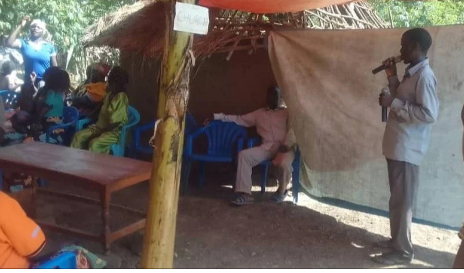
The LC1 Chairperson of Namaganda Village addresses guests during Awor Florence’s celebration party.
The local catechist concluded the event with a message urging the guests to support patients and survivors, “Awor’s experience has made me realize the importance of including fistula education in church sermons to raise awareness and help reduce the stigma surrounding fistula in our communities. That is what the church can do. I want you to think about what role you can play too, and then play that role.”
Young Survivors Shape Their Reintegration Journey
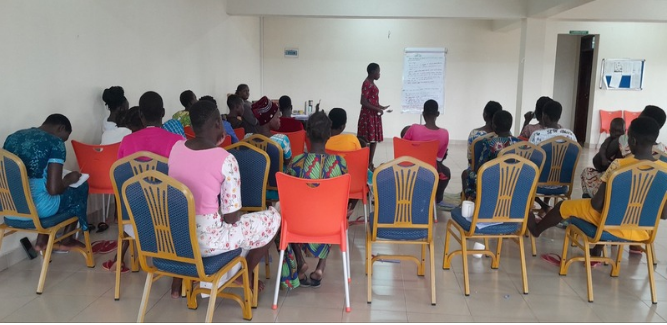
A survivor presenting her group’s idea following a brainstorming session during the young women’s reintegration training.
TERREWODE’s reintegration program stands out for its individualized approach. The program is designed to meet the psychological, economic, and social needs of survivors (former fistula patients) through diverse methods that consider the different barriers that survivors face to their successful reintegration. This quarter, a six-day residential training was held for 27 young survivors, aged 24 and below.
The training used interactive models such as storytelling, role-playing, group discussions, and visual media to facilitate active learning. While the core curriculum remained the same, including health education on obstetric fistula and other childbirth injuries, counseling, financial literacy, and income-generating activities, this cohort had the opportunity to guide the addition of topics they felt were most relevant to their lives. During pre-training evaluations, the young women expressed a strong interest in family planning. Though family planning is typically included in reintegration health education, this training devoted more time to sharing experiences, debunking myths, and exploring the challenges and options related to birth control.
“I was not ready to have children when I got pregnant at 16. I thought that the withdrawal method would stop me from getting pregnant, but now I understand that there are more reliable methods,” said Apolot, from Aminit Bukedea.
In a group brainstorming session, many survivors shared concerns about the accessibility of family planning services. Adong Harriet from Lira District shared, “You go to the hospital and meet women of different ages. Most of them [the older women] gossip about you and judge you. If only these family planning centers borrow the idea of hospitals offering antenatal care and have a day for only young women to go, then we would all go without any shame.”
TERREWODE is supporting survivors’ reintegration into communities by constantly adapting the reintegration program to meet their diverse needs.
Mid-Year Performance Review Meeting
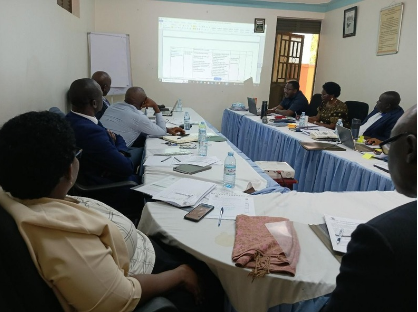
The Board of Governors during the Mid-Year Performance Review meeting.
The Board of Governors convened for the Mid-Year Performance Review meeting on 30th January 2025. During the meeting, the Governors reviewed the patient report presented by Dr. Mary Aono, medical director of Terrewode Women’s Community Hospital; the financial report presented by Mr. Felix Idraku, co-opted Governor; and the program review reports, which included updates on the implementation status of the annual work plan, presented by management.
Following the performance review, the Board Committee on Clinical Excellence and Quality Assurance submitted revised and newly developed clinical policies for approval. The approved policies strengthen the organization’s ability to operate to a high standard across various service areas, including physiotherapy and psychological support.
